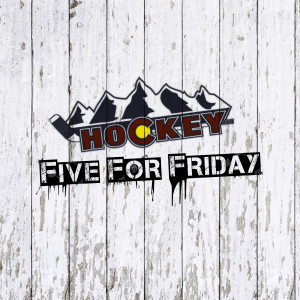Five for Friday – the curated list of hockey links to help you put an end to the last day of the week. Nothing too serious… just some hockey links for the hockey fan in you.
We're always researching for a project/podcast and finding cool stuff worth sharing. Sometimes it's videos, sometimes it's cool tweeps worth following. Other times its articles from folks who swim in the deep end of the hockey knowledge pool. Here's what we've found this week. Stay Awesome!
- Concussions are more and more common as players get Harder, Better, Faster, Stronger. But unlike the K-West song, not dying as the result of a head shot doesn’t actually make you any stronger. As a matter of fact, players in all major sports have begun to fight back with PR and legal action for not getting the proper attention that they deserved after being concussed. It’s a real problem in the world of sports and in particular in the game of hockey. If you haven’t already – check out Gabe’s article on concussions… and just in case you missed the hit that rattled his brains, here you go.
- Gabriel Landeskog while one of the most notable players in recent Avs times to feel the after effects of a big hit, is not the only Avs player to fall victim to concussions either.
Remember Jesse Winchester? I’m not even sure when the concussion happened and it could have been an accumulation of hits over the years. But by the time he landed in Colorado he was having post-concussion symptoms again. Ultimately, he never played a game for the Avs outside of a few preseason games.
- Rattling your brain isn’t something you just recover from and it WILL absolutely change a player’s life. Players often turn to self-medication with prescription drugs and alcohol and yes, weed. While it seems like weed is the answer for everything in Colorado after becoming legal the use of cannabinoids is nothing new in the world of epilepsy and cancer. There is such a thing as non-psychoactive cannabinoids and they are mighty powerful. Watch this TED talk before you make judgments. It’s amazing what a “Schedule 1” drug has done for so many people.
- The league’s solution to the concussion problem is… (The Concussion Protocol is a good start)
“The spotter program is not new, it has been in existence as part of our Concussion Protocol for some time now; the thing that is changing is how we are allowing clubs to deal with the responsibility,” NHL Deputy Commissioner Bill Daly said. “By introducing League-employed-and-trained spotters, we are simply providing our clubs with another alternative to adequately and properly execute the spotter responsibility.”
- Many like to point to fighting as the main reason that players have brain trauma while/after playing hockey and while it’s very true that most enforcers pay for their underappreciated roles later in life, it’s hardly the main or only cause. So long as we have big guys making big hits, we’ll have concussions. It’s an unfortunate reality of the game that is in many cases unavoidable. We could give them bigger helmets. We could make it a no contact league. But what we should really consider is the way we deal with players who have been concussed. I’ve seen some early clips from the forthcoming Ice Guardians movie and it’s truly interesting to hear how these enforcers view what they did for a living. Scott Parker suffers to this day from PTSD symptoms but is 100% clear, and always states that he knew exactly what he was doing.
Honorable mentions:
“The easiest way to explain it would be, it’s the shot that changed my life,” Leeman said. “It changed my career. It changed a lot of things about me.” — Gary Leeman
- Show sponsor: www.avsfam.com – on Facebook – on Twitter
- Other Sponsors
- Subscribe to the Colorado Hockey Podcast on iTunes
